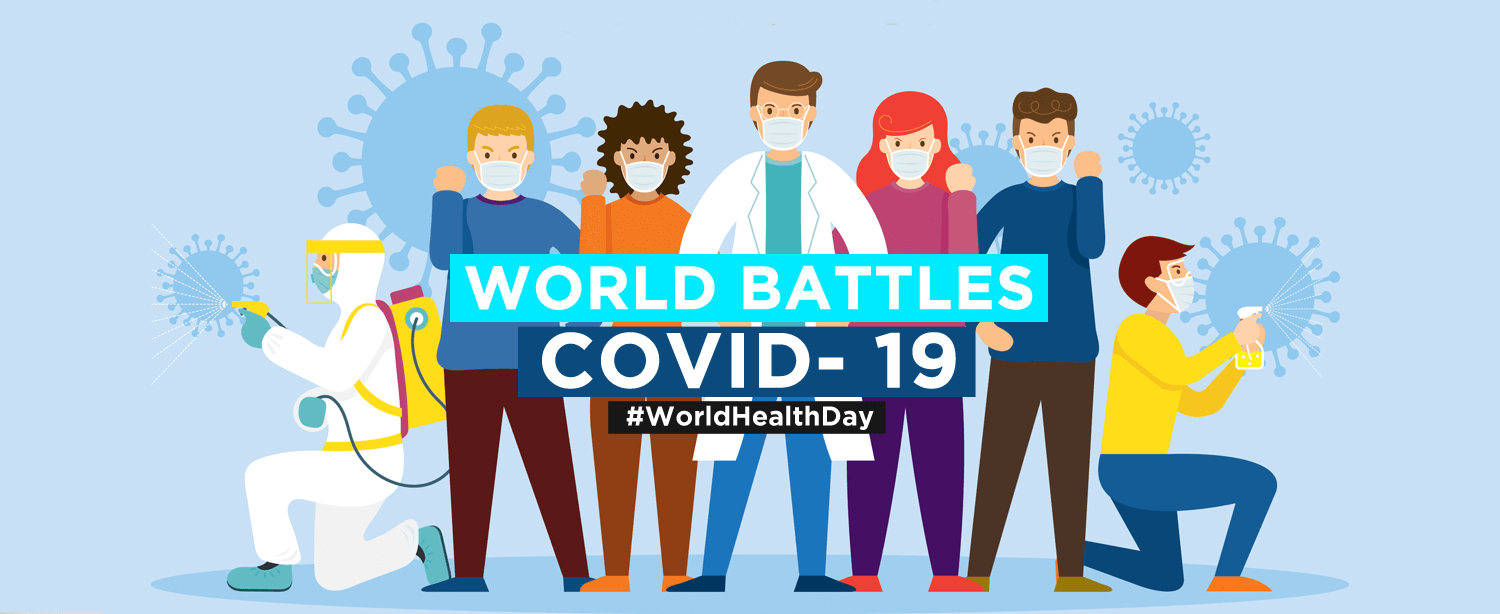World Health Day is observed every year on the 7th of April. Let us take a look at the current global crisis – COVID-19. Global statistics show more than 13 lakh confirmed cases of COVID-19 to date and more than 72,000 deaths.
Covid-19 has spread around the planet, sending billions of people into lockdown as health services struggle to cope. The coronavirus COVID-19 pandemic is the greatest challenge we have faced since World War Two. Why is COVID-19 a pandemic? Pandemic is an escalation and refers to an epidemic that has spread over several countries or continents, usually affecting a large number of people. Since its emergence in Asia late last year, the virus has spread to every continent except Antarctica. Cases are rising daily in Africa the Americas, and Europe.
The US remains the country with the most reported confirmed cases, with more than 337,000, followed by Spain (more than 131,000), Italy (more than 128,000), Germany (more than 100,000) and France (more than 93,000). India has recorded more than 4200 cases so far.
Most cases in India are of people who had a travel history to coronavirus infected countries or had come in contact with a person who had recently travelled abroad, this is called local transmission. As per The Indian Council of Medical Research (ICMR), India has still not reached the stage of community transmission of coronavirus.
Important things to note about COVID-19
- There is currently no vaccine to prevent coronavirus disease 2019 (COVID-19).
- The best way to prevent illness is to avoid being exposed to this virus.
- Whilst the virus infects people of all ages, there is evidence that older people (60 and over), and those with underlying health conditions (such as cardiovascular disease, diabetes, chronic respiratory disease, and cancer), are at a higher risk.
- COVID-19 may be spread by people who are not showing symptoms.
How is COVID-19 spread?
The virus is thought to spread mainly from person-to-person.
- Between people who are in close contact with one another (within about 6 feet).
- Through respiratory droplets produced when an infected person coughs, sneezes or talks.
- These droplets can land in the mouths or noses of people who are nearby or possibly be inhaled into the lungs.
- A person can get COVID-19 by touching a surface or object that has the virus on it and then touching their mouth, nose, or possibly their eyes.
Protect yourself from COVID-19
- Everyone should frequently wash their hands with soap and water and scrub for at least 20 seconds. Use an alcohol-based sanitizer in the absence of water.
- Cover your nose and mouth with a disposable tissue or flexed elbow when you cough or sneeze.
- Stay at home.
- Don’t touch your eyes, nose, or mouth if your hands are not clean.
- Avoid close contact with people who are sick.
- Practice social distancing.
- Everyone must wear a cloth face cover when they have to go out in public, to buy essentials.
- Clean AND disinfect frequently touched surfaces daily. This includes tables, doorknobs, light switches, mobile phones, handles, desks, keyboards, etc.
Suspect COVID-19?
People with COVID-19 usually have mild to severe respiratory illness with symptoms of fever, cough, shortness of breath. Some people may have symptoms like muscle aches, headache, sore throat, or diarrhoea. These symptoms may appear 2-14 days after exposure. If you suspect you have COVID-19 follow these steps:
- Stay at home and rest.
- Contact your nearest healthcare provider for testing and further action.
- Do not visit the hospital without informing in advance.
- Separate yourself from other people in the home as much as possible.
- Use a face mask at all times.
- Ask family members to self-quarantine themselves for 14 days.
- You can dial the government helpline number 011-23978046 or email to ncov2019@gmail.com for further details on coronavirus.
How is India fighting the pandemic?
The COVID-19 infection rate in India remains relatively low as compared to its 130 crore population size. However, India has acted fast and taken some strict measures at the earliest. India is the world’s second-most populous country and has large numbers of poor living in crowded, unsanitary conditions. Here are the measures taken by India to help contain the spread of coronavirus in the country:
- All international and domestic air travel is suspended.
- PM Narendra Modi has declared a 21-day nation-wide lockdown to stop the spread of coronavirus.
- All schools, colleges, government and private offices are closed.
- All inter-state bus services and metro services across India are suspended.
- Everyone has been advised to stay at home.
Strict adherence to lockdown, regular handwashing, and effective measures for social distancing will help contain the spread of this pandemic. We are all together in this fight against coronavirus. Let us support each other. Stay at home and stay safe as doctors, nurses and other support staff work endlessly to fight coronavirus.


